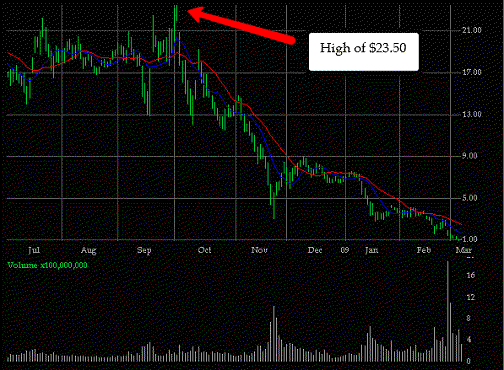Penny stocks have long been enticing to investors as potentially holding a major potential reward.
Let's play that good old-fashioned psychologist game, word association. We will throw out a company name, you make note of the first thing that pops into your head. Level 3 Communications (LVLT), American International Group (AIG), Sirius XM Radio (SIRI), Tenet Healthcare (THC), Fannie Mae (FNM), Infineon Technologies (IXF), Genworth Financial (GNW), E*Trade Financial (ETFC), and Coeur D'Alene Mines (CDE).
Done with that group? Okay, let's add some others to the mix: Unisys (UIS), Rite Aid (RAD), Ballard Power Systems (BLDP), Citigroup (C), and Blockbuster (BBI). Think about the first word that popped into your head for each of these - was it penny stock? Odds are it wasn't, because not many people think that companies with market caps as large as these could be penny stocks. However, all of these companies are trading under $1 currently.
Penny stocks have long been enticing to investors as potentially holding a major potential reward - and that is the problem here, the word potential. There is an old country adage that potential is another word for failure - but we'll take a look at that in a minute.
What is alluring to many novice investors is that you could own a share of Level 3 for less than a dollar - same with a share of Coeur D'Alene or Citigroup. However, does the potential loss outweigh the reward? There are 1000s of trading accounts in America filled with stocks bought under $2.00 that are now worthless.
Many different definitions exist for penny stocks, but the one constant is that the stock is low-priced and often holds a small market cap. Interesting, by following this definition, Citigroup would likely not be a penny stock, nor would any of the other names mentioned earlier. But yet they are trading below $1, so they inherently are very risky.
That said, you can own shares of former market powerhouses for less than a buck - is it worth a shot? Let's take a look at a chart of Citigroup. This is a daily chart spanning back to early July 2008. The stock's near-term high of $23.50 was hit in October 2008, but then the stock was hit - hard. With the stock wallowing under a dollar, is this penny stock a buy?
Citigroup (C) Daily Chart 
In general, the answer would be no. Stocks under $5.00 are generally high risk, under $2.00 are very high risk, and under $1.00 are usually going to 0. Many micro-cap companies with shares under $1.00 (the kind you get random "hot tips" about) are in fact actually scam/sham/shell companies, whose shares are being manipulated by a group. Many mutual funds cannot even buy shares of companies trading under $10.
In the unusual case of gigantic companies trading under $1.00 that we are seeing today, the answer of whether to buy these is also basically no. These companies are not in general going out of business -- but what will likely happen (what the market is pricing as an extremely high likelihood of happening) is that the equity (common stock) will go worthless, the company will re-organize, pay off debtors (to some degree), then either re-issue new shares eventually, go private, or merge. But the common stock holders get nothing in most all cases.
Could some of these former blue-chips trading under $1 come back? Certainly. But the odds are very strong that they will not. So beware the bottom-fishing on these types of names, unless you are prepared to deal with the stock going worthless.
Many traders fall for the allure of the penny stock, especially when they first begin investing. They figure they can buy 1000 or more shares of one stock vs 10 of another. However, if that penny stock goes to zero, you still lose all the $ you put in. So tread very lightly and do all the research you can before dipping a toe into the penny stock pool, even for the big names.
There is a reason penny stocks are penny stocks, perhaps it is poor management, poor business plans, poor execution of said plan, a violent economic turn, too much debt, or just an avalanche of short selling and negative sentiment. Whatever the reason, make sure to perform your due diligence when it comes to speculating in extremely low priced shares.
Price Headley is the founder and chief analyst of BigTrends.com.